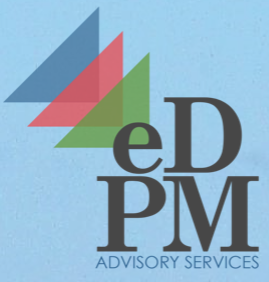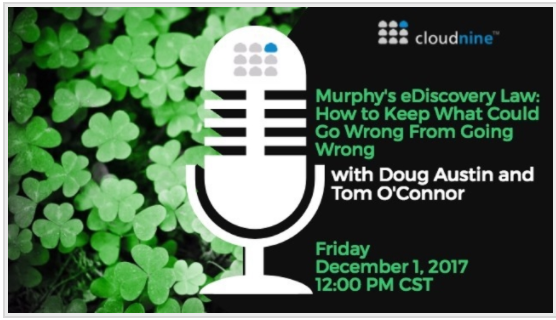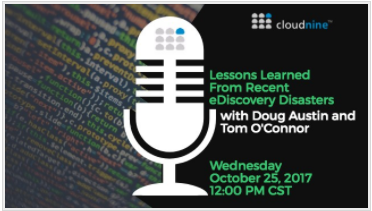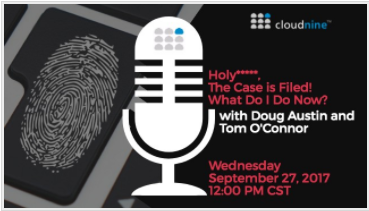eDiscovery Project Management from Both Sides: eDiscovery Best Practices
Editor’s Note: Tom O’Connor is a nationally known consultant, speaker, and writer in the field of computerized litigation support systems. He has also been a great addition to our webinar program, participating with me on several recent webinars. Tom has also written several terrific informational overview series for CloudNine, including his most recent one, Preparing for Litigation Before it Happens, which we covered as a webcast on September 26. Now, Tom has written another terrific overview regarding pre-litigation considerations titled eDiscovery Project Management from Both Sides that we’re happy to share on the eDiscovery Daily blog. Enjoy! – Doug
Tom’s overview is split into four parts, so we’ll cover each part separately. Here’s the first part.
Introduction
I’m going to show my age now and quote an old Joni Mitchell song:
I’ve looked at clouds from both sides now
From up and down and still somehow
It’s cloud’s illusions I recall
I really don’t know clouds at all
That’s how I feel about Project Management, which we’ll refer to as PM for the remainder of this article. PM has been a major topic at trade shows recently, especially when Mike Quartararo is speaking. Why?
Well first because Mike’s discussions on how to handle PM are thoughtful and comprehensive. He is a graduate of the State University of New York, after which he studied law for one year at the University of London. He is a certified Project Management Professional (PMP) and a Certified E-Discovery Specialist (CEDS). And he was the Director of Litigation Support at Stroock & Stroock & Lavan LLP in New York for 10 years. Now, Mike has his own consultancy practice at eDPM Advisory Services.
And perhaps most important, Mike has literally written the book on the subject. It is called Project Management in Electronic Discovery: An Introduction to Core Principles of Legal Project Management and Leadership In eDiscovery and is available on his web site, www.eDiscoveryPM.com (and also on Amazon here).
But after listening to Mike speak at the recent ILTACON18 conference, Doug Austin mentioned to me that it seemed there is another side to PM that is being ignored, that of the lawyer’s opinion on the subject. Since discovery is the most time-consuming and expensive aspect of litigation, managing it effectively is always a concern of the lawyers but we seldom hear what they think of all the talk about PM. So, let’s look at the issue from both sides now.
We’ll explore the implementation of eDiscovery project management from both sides, as follows:
- The Project Manager’s Perspective to Project Management
- The Lawyer’s Perspective to Project Management
- Conclusion
We’ll publish Part 2 – The Project Manager’s Perspective to Project Management – on Wednesday.
So, what do you think? How does your organization apply project management to your eDiscovery projects? As always, please share any comments you might have or if you’d like to know more about a particular topic.

Sponsor: This blog is sponsored by CloudNine, which is a data and legal discovery technology company with proven expertise in simplifying and automating the discovery of data for audits, investigations, and litigation. Used by legal and business customers worldwide including more than 50 of the top 250 Am Law firms and many of the world’s leading corporations, CloudNine’s eDiscovery automation software and services help customers gain insight and intelligence on electronic data.
Disclaimer: The views represented herein are exclusively the views of the author, and do not necessarily represent the views held by CloudNine. eDiscovery Daily is made available by CloudNine solely for educational purposes to provide general information about general eDiscovery principles and not to provide specific legal advice applicable to any particular circumstance. eDiscovery Daily should not be used as a substitute for competent legal advice from a lawyer you have retained and who has agreed to represent you.











